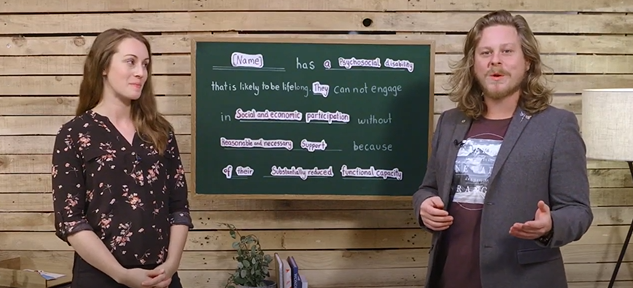Thanks for joining us in our Embark blogpost series, where we address some of our tips for supporting people with accessing the NDIS. Embark provides support to people in the Sydney Metropolitan area that are living with a mental health condition and experiencing, or at risk of, homelessness, to access the NDIS. [You can make a referral to our free service via: www.icla.org.au/embark/]
You can also get in touch for support – via Embark Upskill, we facilitate free workshops across NSW, open to anyone who wants to improve their confidence and understanding of the NDIS in order to support people with a mental illness to access the NDIS and obtain the supports they need. [Make an enquiry via: www.icla.org.au/embark/upskill]
NDIS applications: Getting the Words Right
NDIS applications are all about getting the words right! So, in today’s post, we look at our tried and true advice, for doing just that, for getting successful NDIS applications across the line.
It’s important to remember that decisions about who can and cannot access the NDIS are made by NDIS Assessors (in the NDIA National Access Team). These assessors are trained in understanding NDIS legislation and applying it. They are not medical professionals, so they rely on information provided by you to match with the access criteria. An Assessor needs to be sure that the person meets each access criterion, so it is important that the evidence you provide is clear, concise, relevant and consistent, and demonstrates that:
- the person has a disability that is attributable to one or more intellectual, cognitive, neurological, sensory or physical impairments or to one or more impairments attributable to a psychiatric condition (which may vary in intensity); and
- the impairment or impairments are, or are likely to be, permanent; and
- the impairment or impairments result in substantially reduced functional capacity in one or more of the areas of communication, social interaction, learning, mobility, self‑care and self‑management; and
- the impairment or impairments affect the person’s capacity for social or economic participation; and
- the person is likely to require support under the National Disability Insurance Scheme for the rest of their lifetime.
So, how do you speak NDIS?
Our former team-mates have taken a lighter look at this for us – it’s worth a watch!
Completing the Evidence of Psychosocial Disability Form
- When evidencing a psychosocial disability – you can use our tips for filling out the Evidence of Psychosocial Disability Form: https://www.ndis.gov.au/understanding/how-ndis-works/mental-health-and-ndis#evidence-of-psychosocial-disability-form
- We’ve covered off more about filling out this form, in previous posts: https://icla.org.au/embark/2022/01/25/accessing-the-ndis-with-a-mental-health-condition/
Writing effective NDIS support letters
Still want more? This next video takes a deeper dive into writing effective support letters. It’s a bit more dry, but it gets to the heart of what’s needed when getting that NDIS evidence together.
Take home messages
- When it comes to the NDIS, the language matters – NDIS assessors are working to assess this claim against the law (using the NDIS Act)
- There are some key phrases to remember:
- The person has a disability / psychosocial disability that is likely to be lifelong
- They’ve exhausted all available and appropriate treatments
- They have substantially reduced functional capacity (across 6 areas)
- They are unable to engage in social and economic participation
- They require reasonable and necessary support from the NDIS
- They require support from the NDIS for the duration of their lifetime.
Disclaimer: While this post and video are expected to be accurate at the time of publishing, it is important to remember that policies and processes within the NDIA can change, and that up-to-date information should be obtained directly from the NDIS website.
Thanks again for joining us. Please be in touch with any questions or suggested topics for future content via embark@icla.org.au.
ICLA’s Embark program is funded by the NSW Ministry of Health to support people with a mental health condition who are experiencing, or at risk of, homelessness to access the NDIS.



Recent Comments